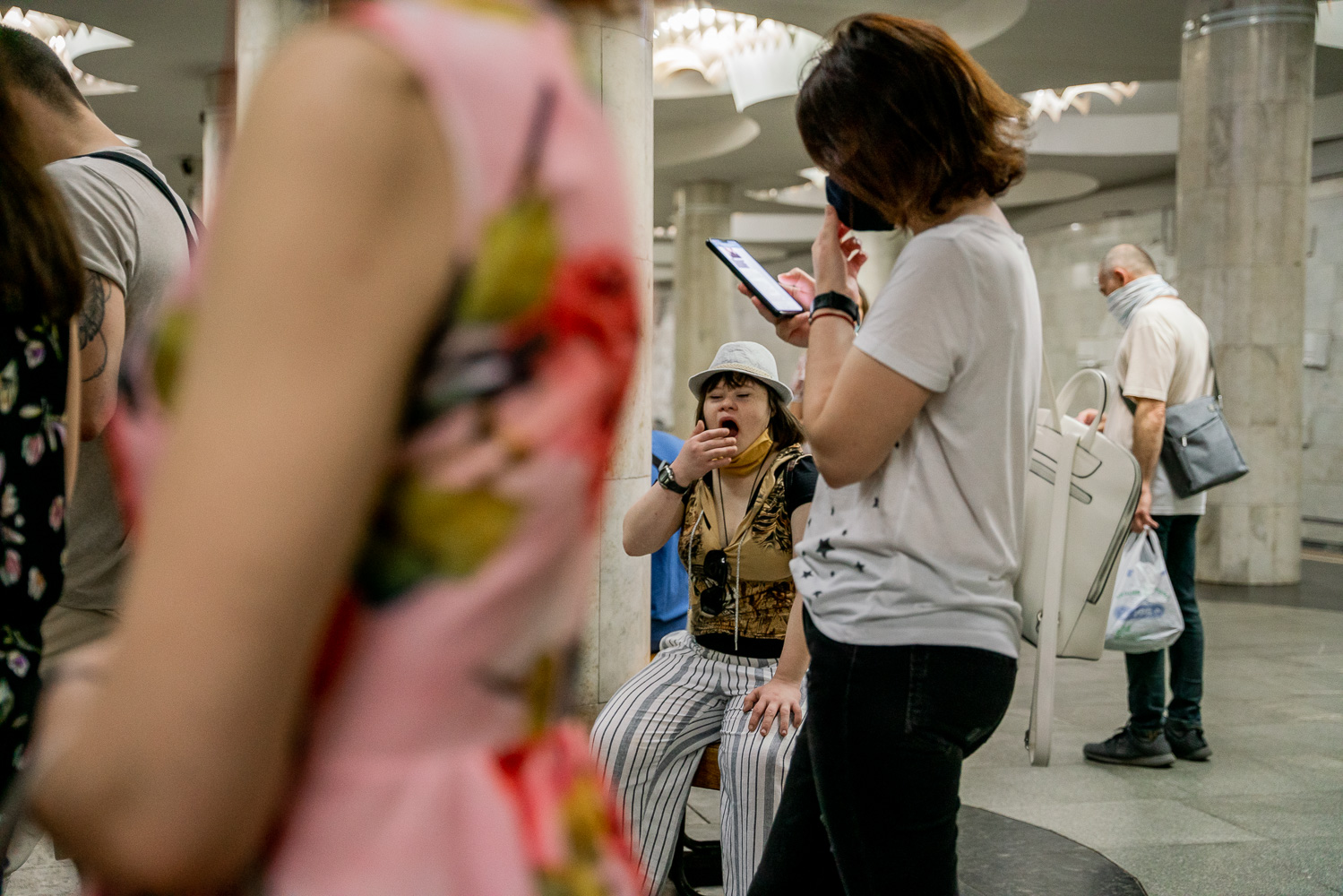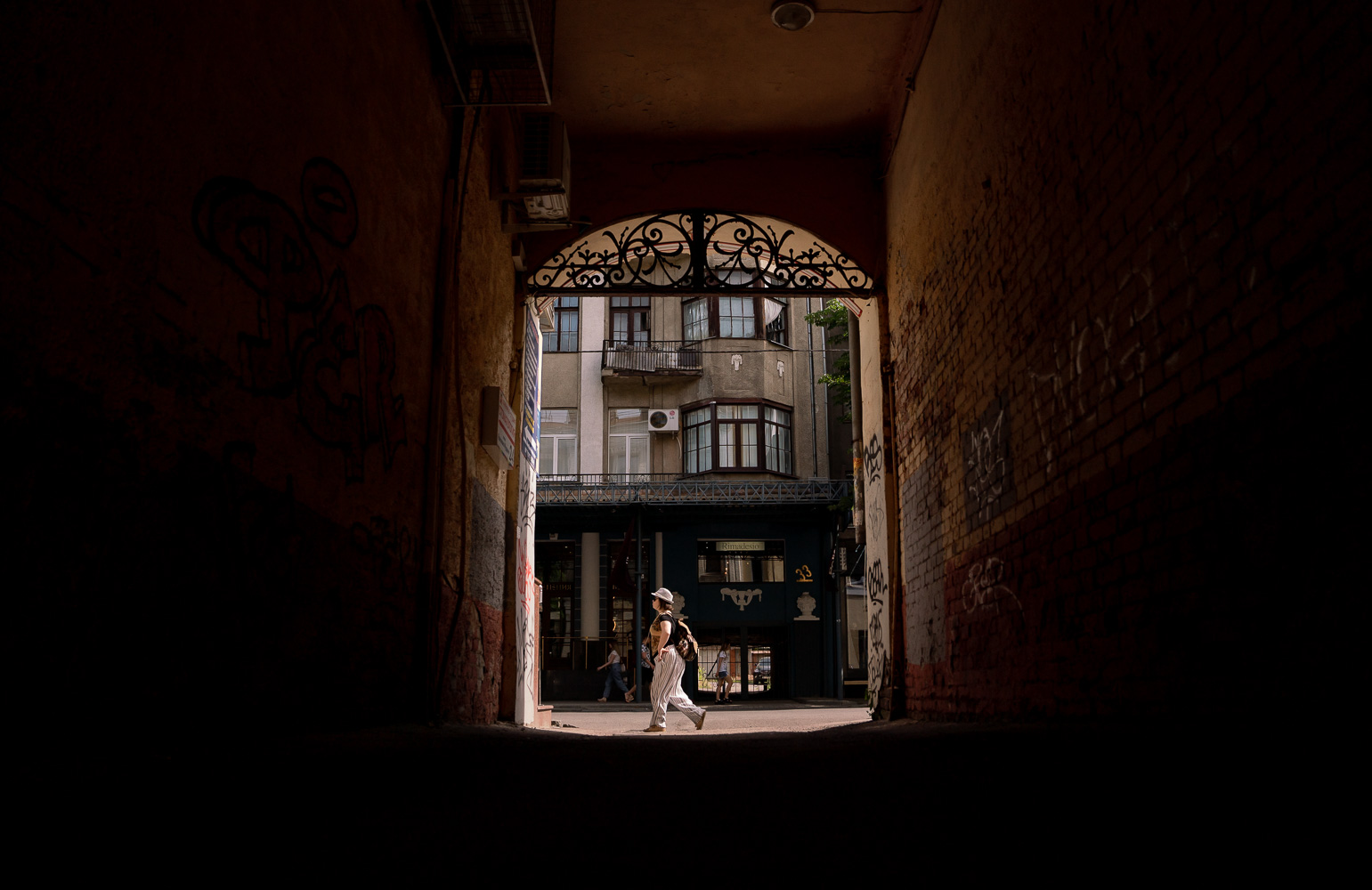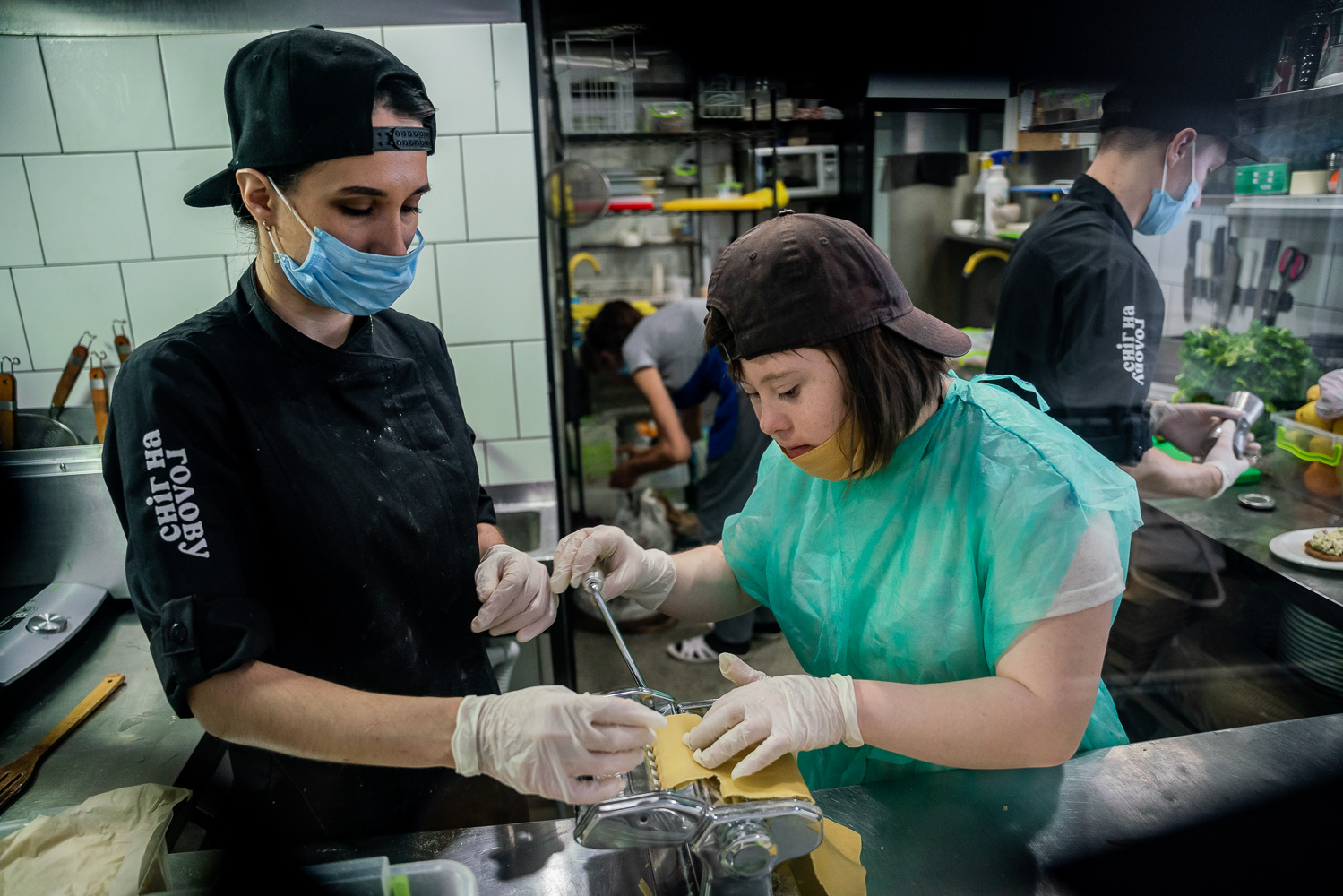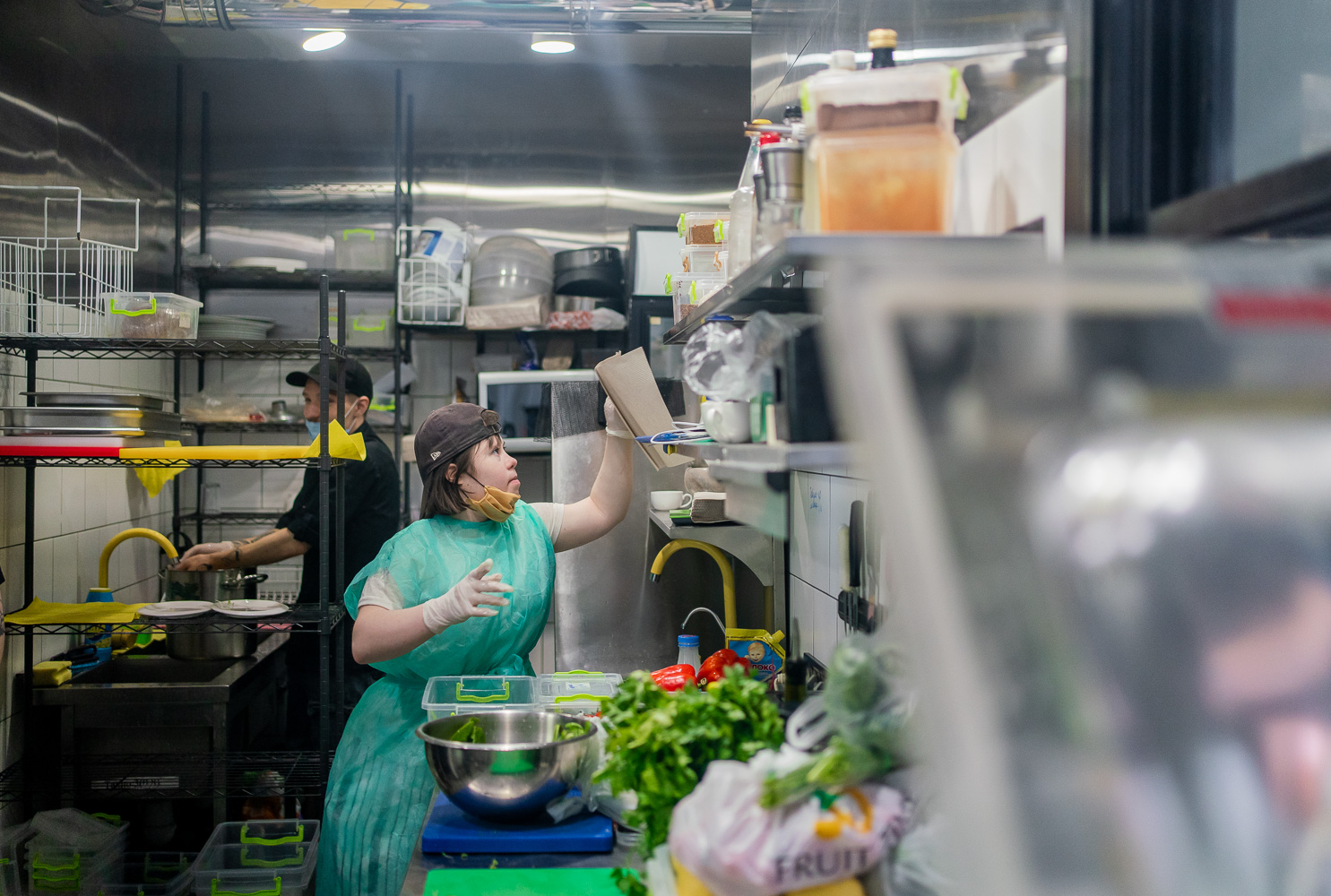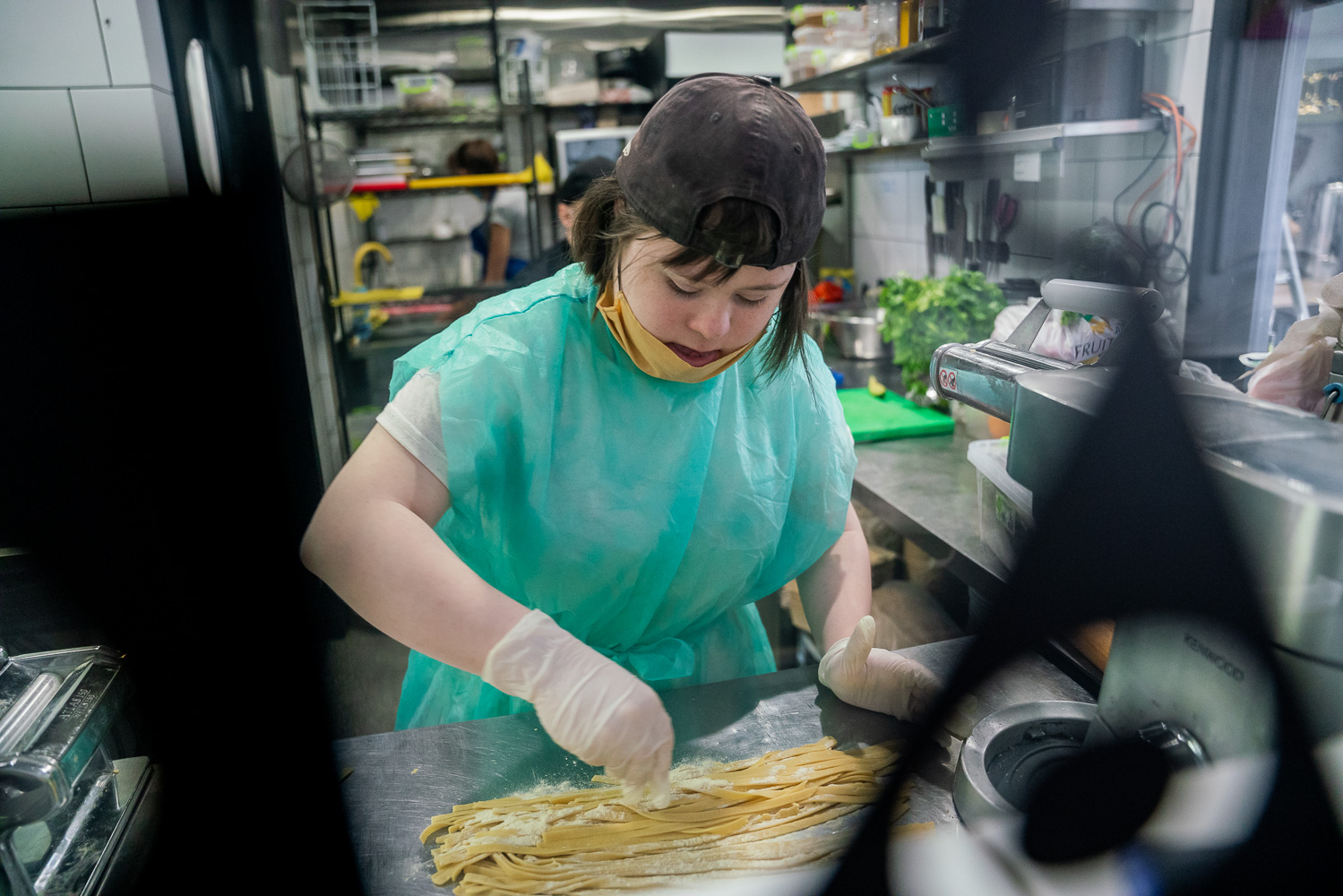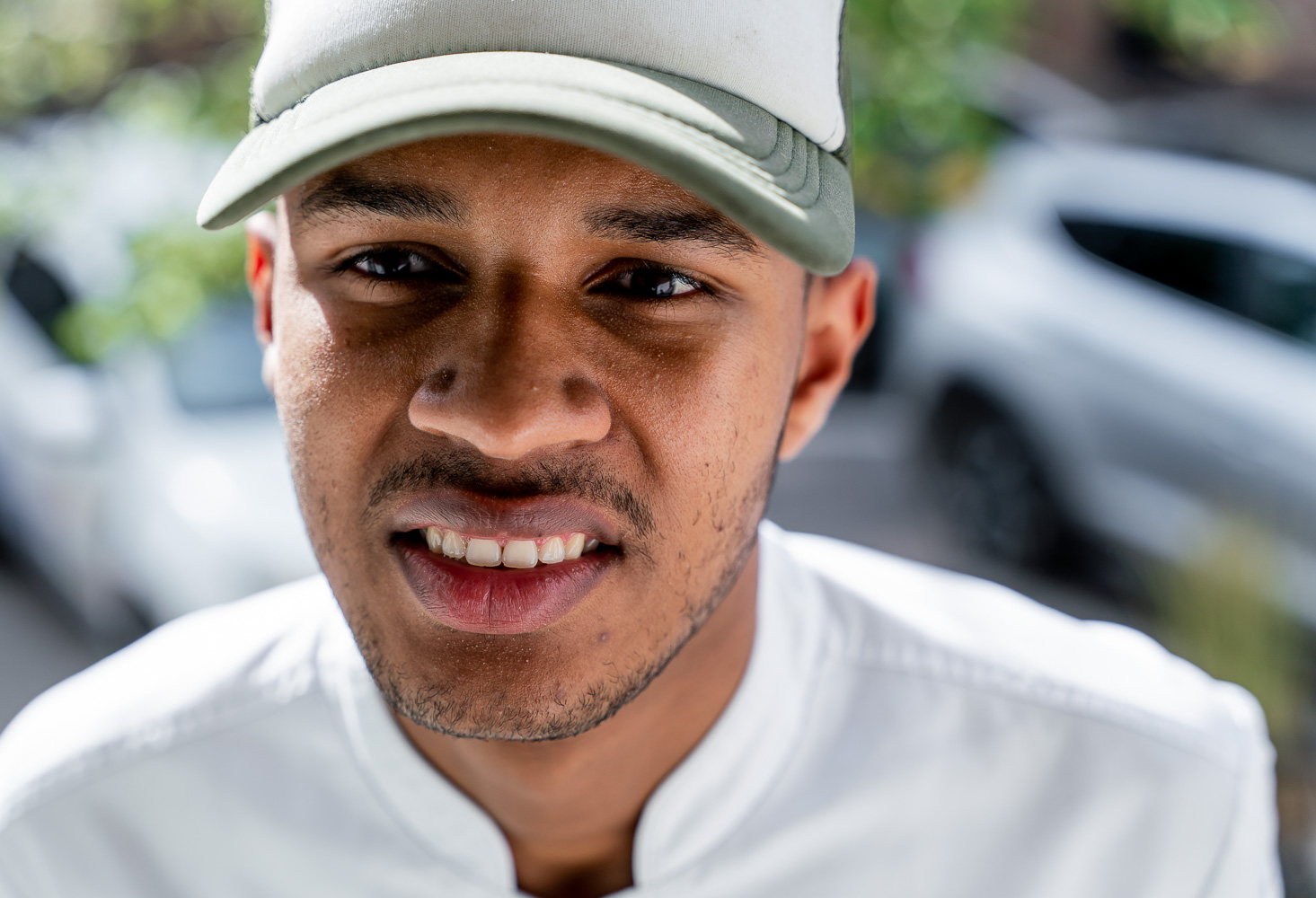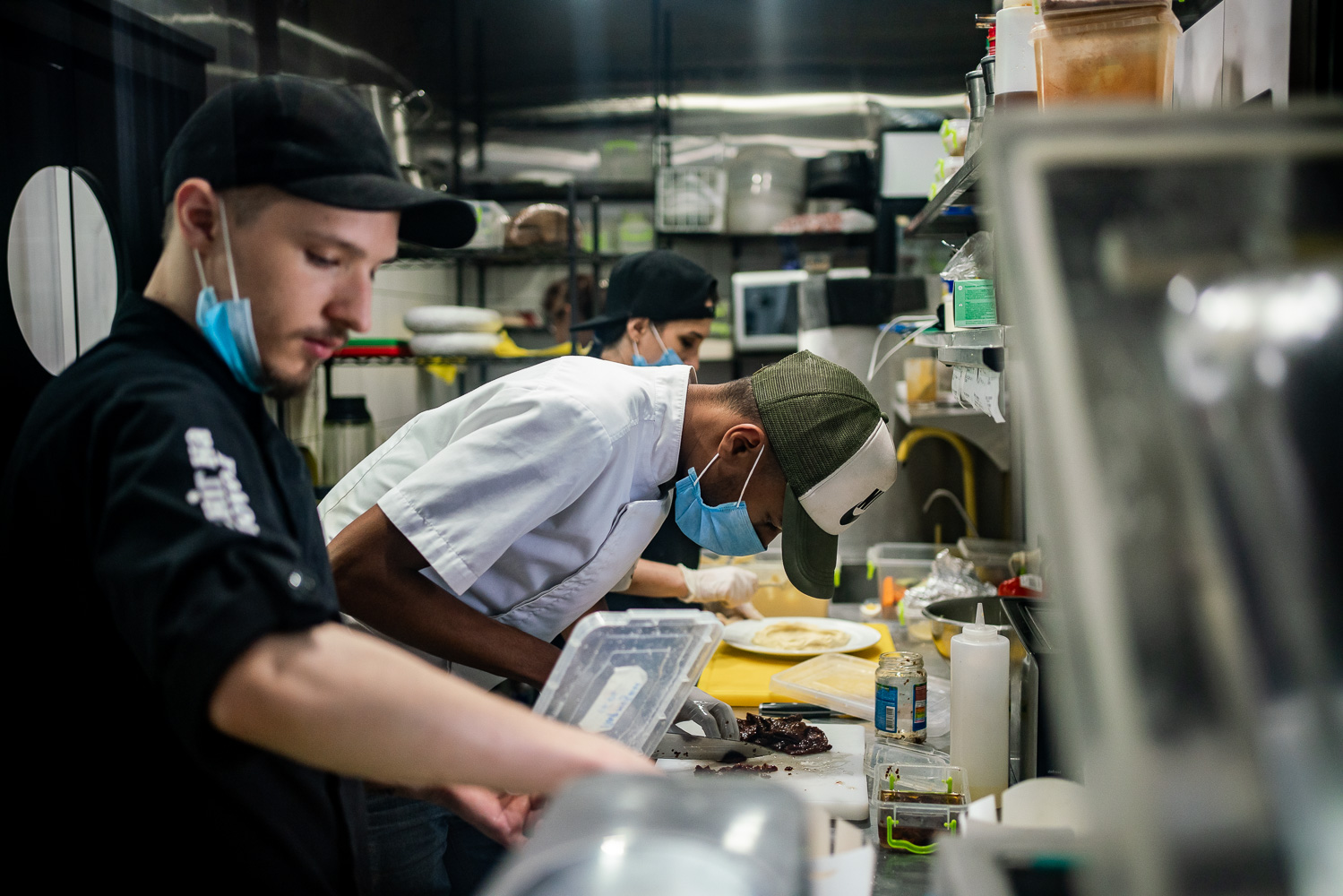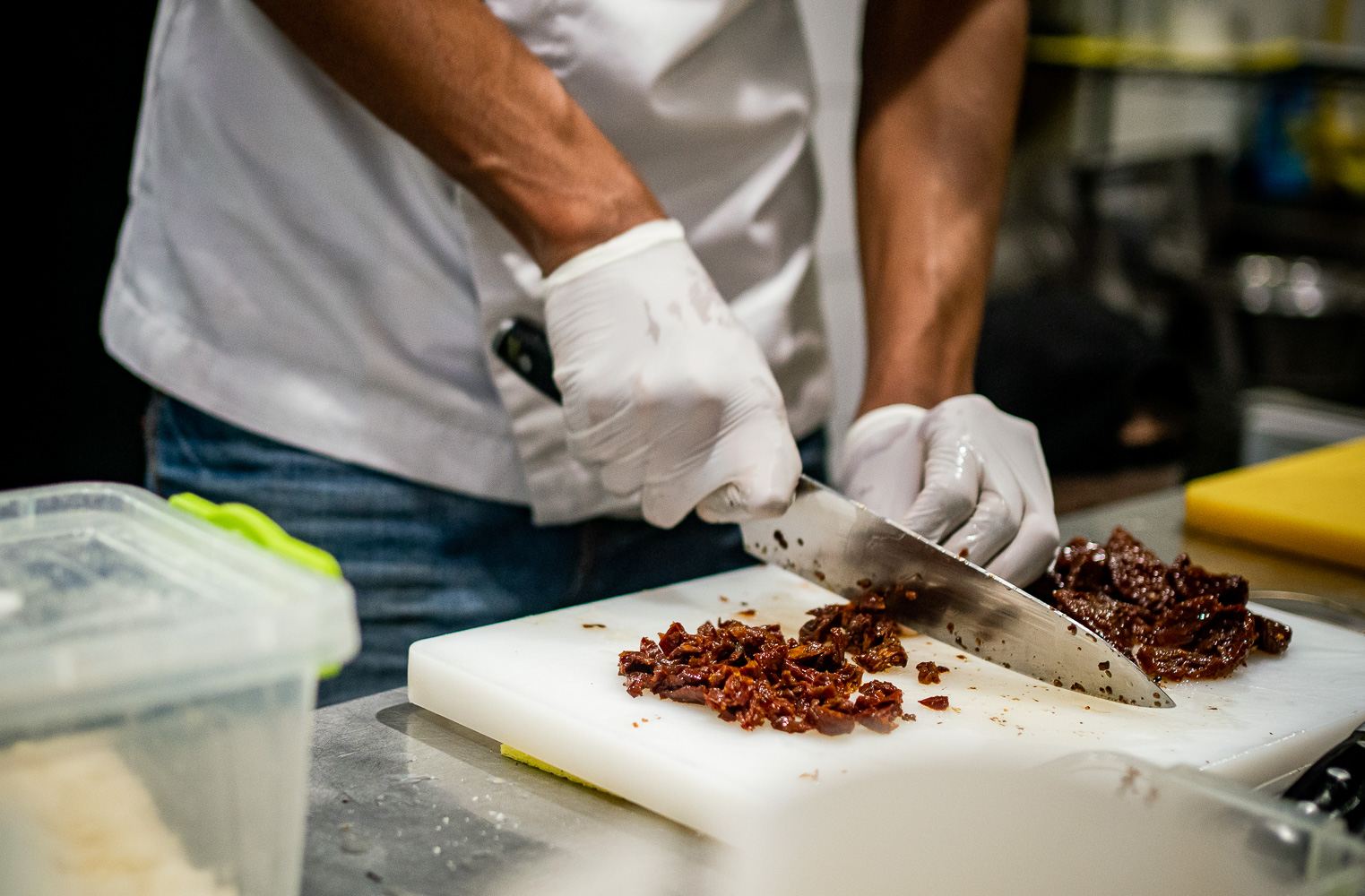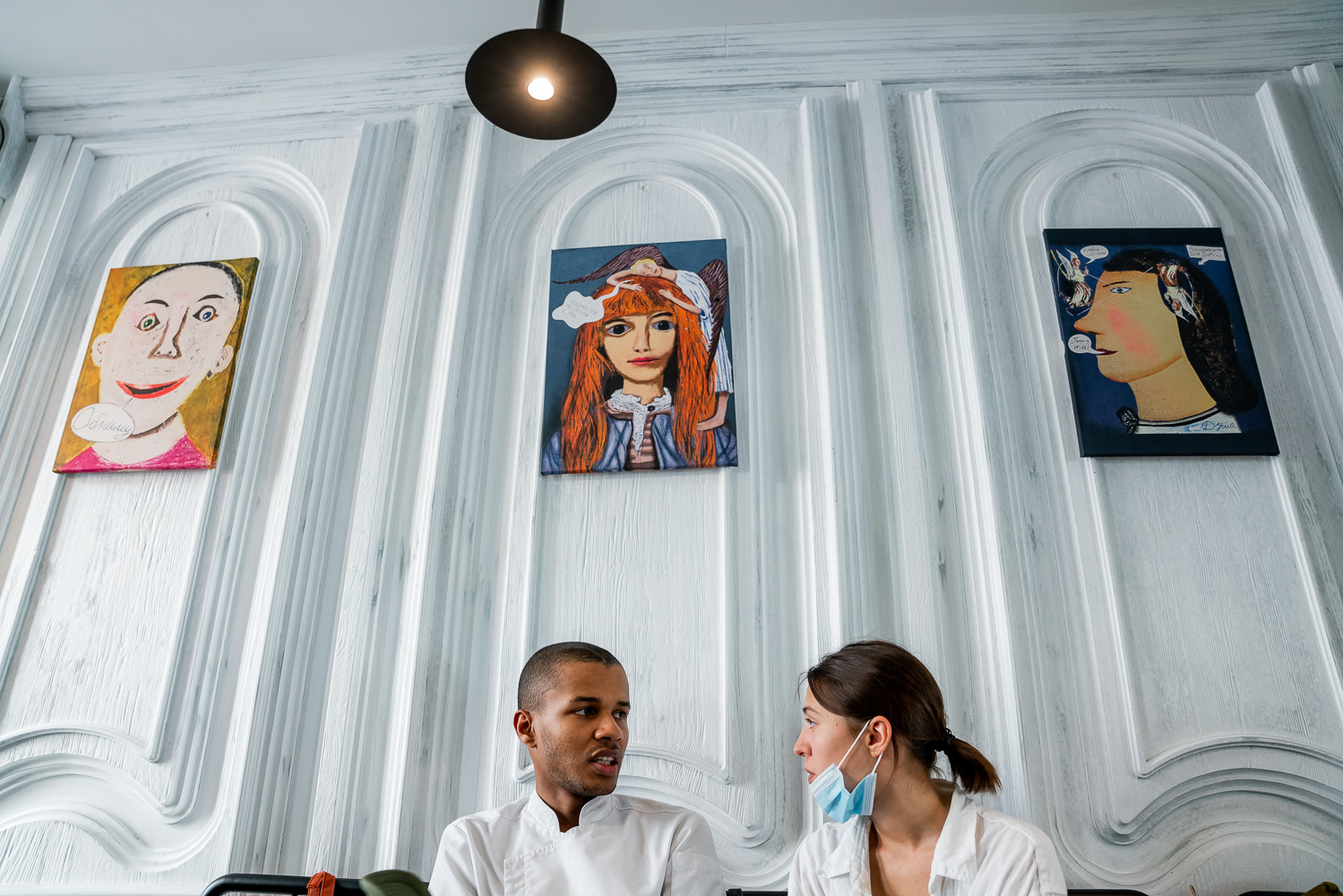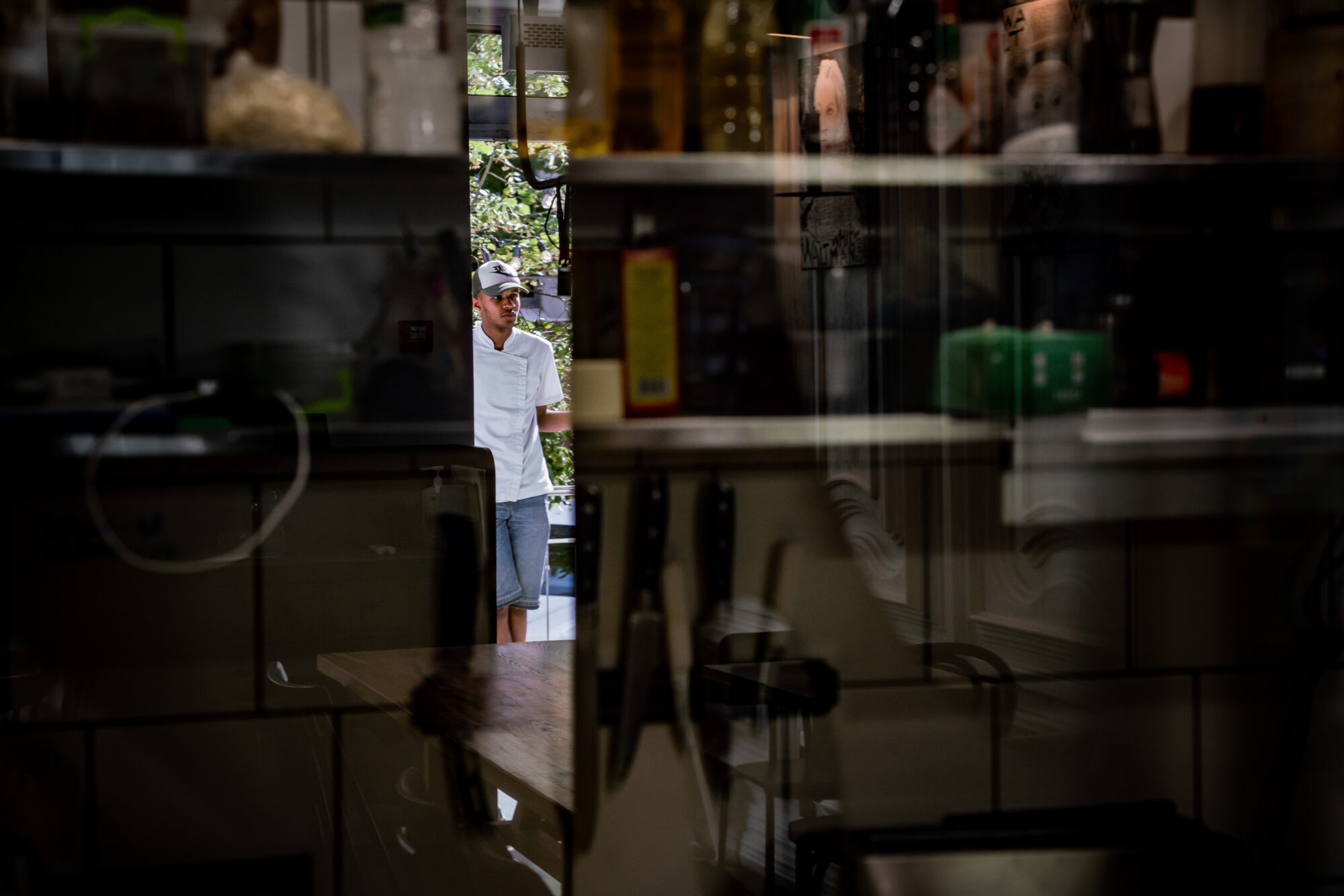
A Bolt from the Blue
Residents are gathering in the yard of an old three-story building in downtown Kharkiv. In winter, Snih Na Holovu (A Bolt from the Blue) was opened on the ground floor of the residential building—it is a restaurant employing mentally disabled individuals. And now the owners of the establishment have invited the neighbors to discuss the idea of opening a summer terrace. Unfortunately, a constructive conversation will not happen: some residents will unanimously declare that they are afraid to let their children out in the yard, “because those strange people work for you” and “no one knows what is going on in their heads—they might attack someone”.
Despite having all the permits and a burning sense of injustice, the restaurant’s founders, Kharkiv residents Tetiana Kameneva and Mykhailo Chornomorets immediately decide not to open the summer terrace. Yet, they will not give up their shared dream—to create a society where everyone with a mental disability has a worthy place.
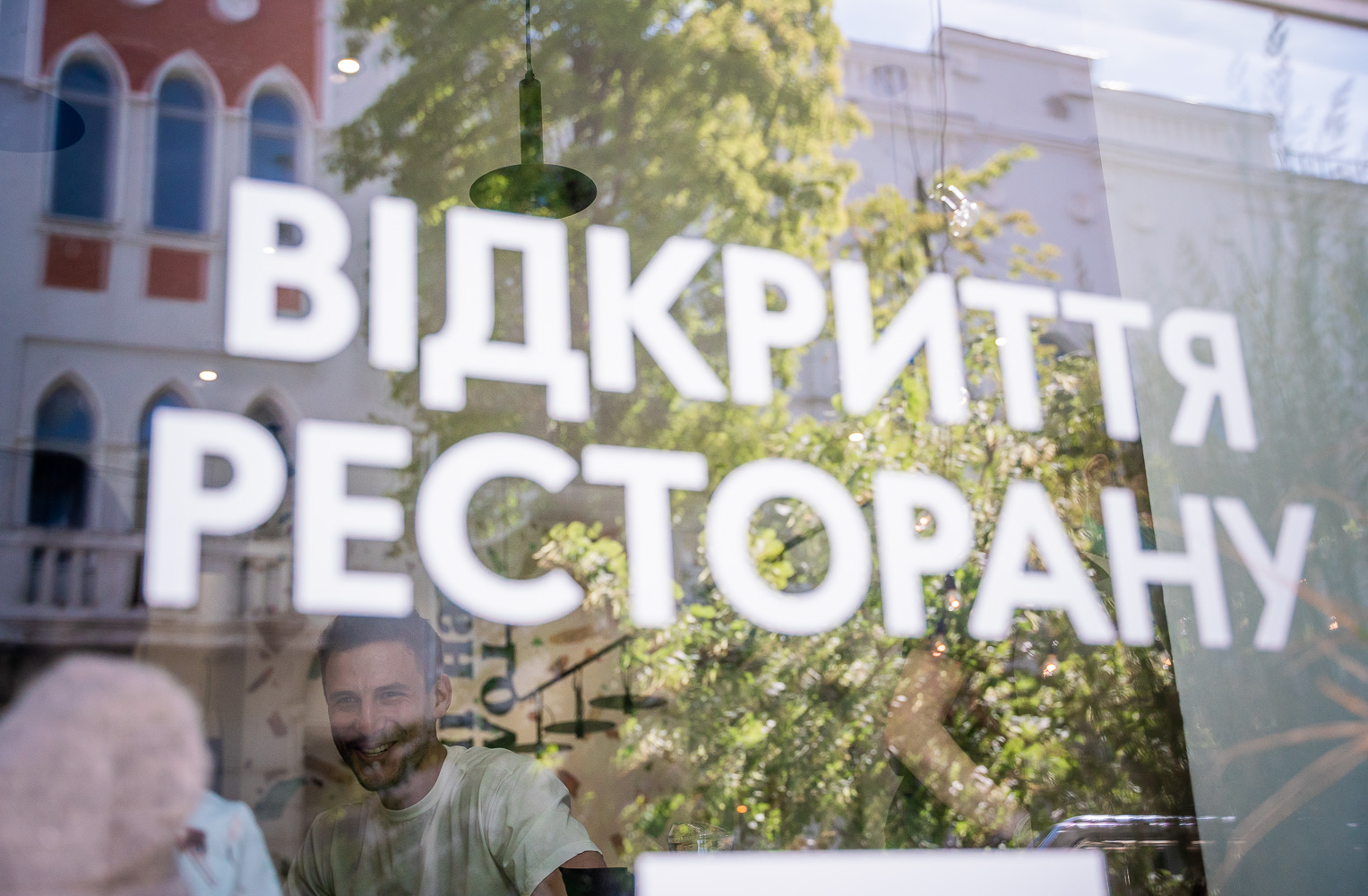
“Beware of Pity”
“Come on in! You must be tired after the trip. Would you like some coffee? Water? Would you like something to eat?” the co-owner of Snih Na Holovu invites us inside the place. There are about a dozen tables seating different numbers of visitors, modern art on the walls, designer lamps and, as befits good restaurants, a kitchen with a large glass wall, so that visitors can witness the cooking process.
Previously, 23-year-old Tetiana worked in PR and telecommunications. As a child, together with her younger sister, she loved watching the ceremony of the most prestigious creative marketing award—Cannes Lions International Festival of Creativity: especially the part with the coolest public service ads from around the globe. She says the desire to engage in a combination of public relations and socially important projects came from there. Tetiana started feeling the problems of people with disabilities having read “Beware of Pity”, a novel by Austrian writer Stefan Zweig, which tells the story of a lieutenant whose fainthearted compassion, but in fact a disguised wish to protect his comfort from the sufferings of a fellow human being, leads to the suicide of the partially paralyzed heroine.

Friends introduced the girl to her future partner, IT specialist Mykhailo, who is ten years older. For several years before that, the founders of the restaurant kept hearing from mutual friends: “You have to join forces! You have similar ideas and are both keen on employing people with disabilities.”
“I was impressed that someone else in Kharkiv was dreaming of opening a socially responsible restaurant and had a similar vision for its development—not just to help these people adapt to society, but also to teach society to accept them like anyone else,” Tetiana says, sipping on strong coffee.
Mykhailo’s attitude to people with disabilities was nurtured by his mother. As a child and a teenager, he spent his summer vacations in Yevpatoria. Since Soviet times, the seaside town has been home to recreation centers where children with congenital diseases such as cerebral palsy can go for treatment.
Seeing a large number of peers in wheelchairs and on crutches in the local park, Mykhailo fired off: “Oh, wow! Why are there so many of them? Isn’t this a place for normal people?” His mother said: “You are dead wrong. We are all equals, they are no different to us”.
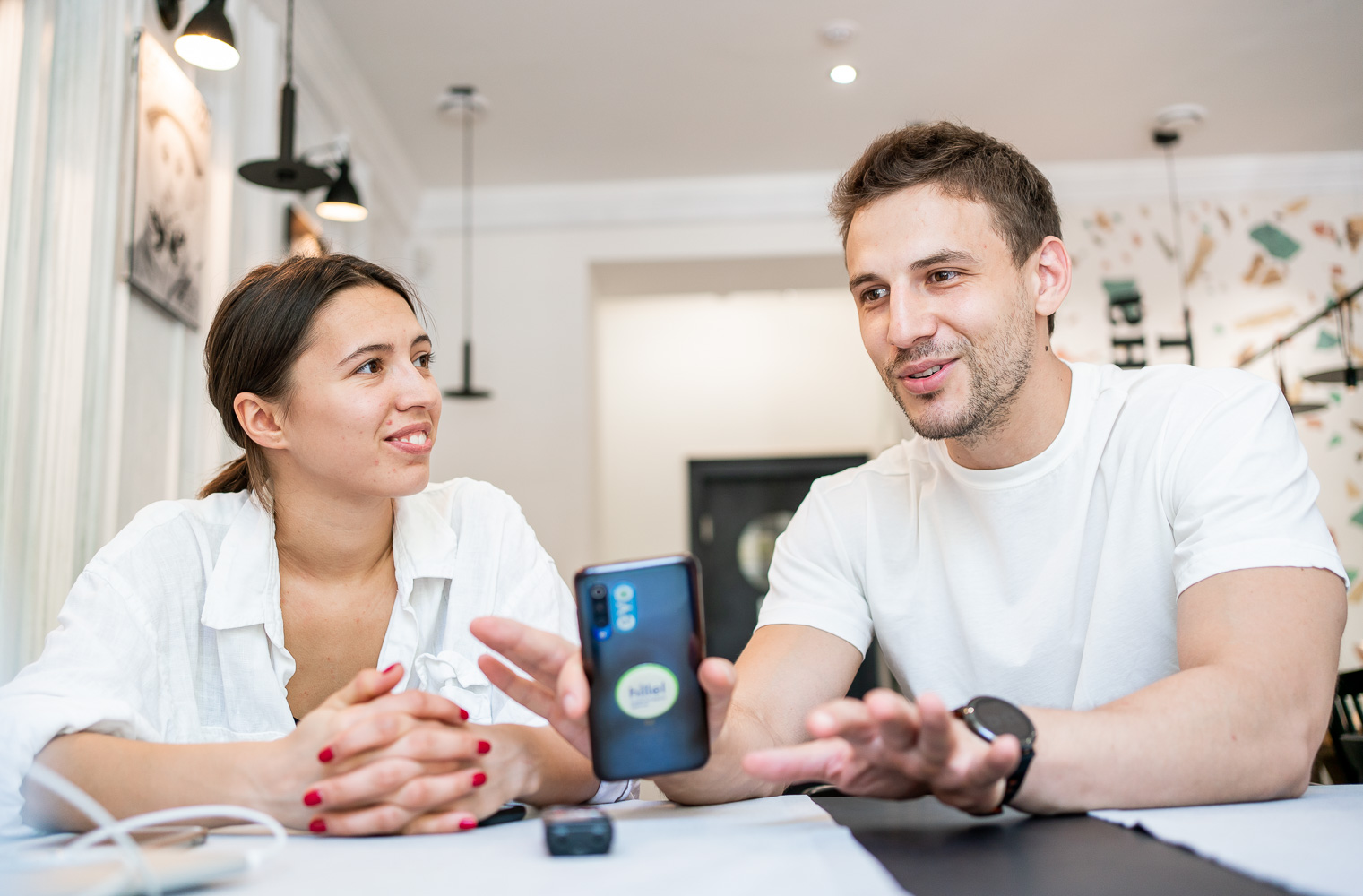
Initially, the partners expected to open the restaurant in a few months. But they gave a timely thought to the fact that a business has to have a clear plan: from accounting and financial planning to design and the assessment of reputational risks. So, they took a serious approach to the endeavor: they hired a team of strategists and conducted a large hackathon (hacking marathon, this once purely IT term now means intensive collaboration on new ideas), to which they invited friends who were experts in various fields. The name of the future establishment was agreed at the hackathon—after all, mental disability usually comes as a surprise: a child is born, and seems to be developing like everyone else, and suddenly its parents hear: “Your baby has an autism spectrum disorder.” Also, Tetiana and Mykhailo hired one of the most expensive Ukrainian design teams who created the visual components of the business, such as its logo and font.
The partners quickly realized that premium services come at a high price: it was hard for them to do this all on their own, so they needed to involve others. Today, the owners of Snih Na Holovu have several like-minded investors, have broken even and have learned to survive despite the quarantine by launching delivery and pick-up services.
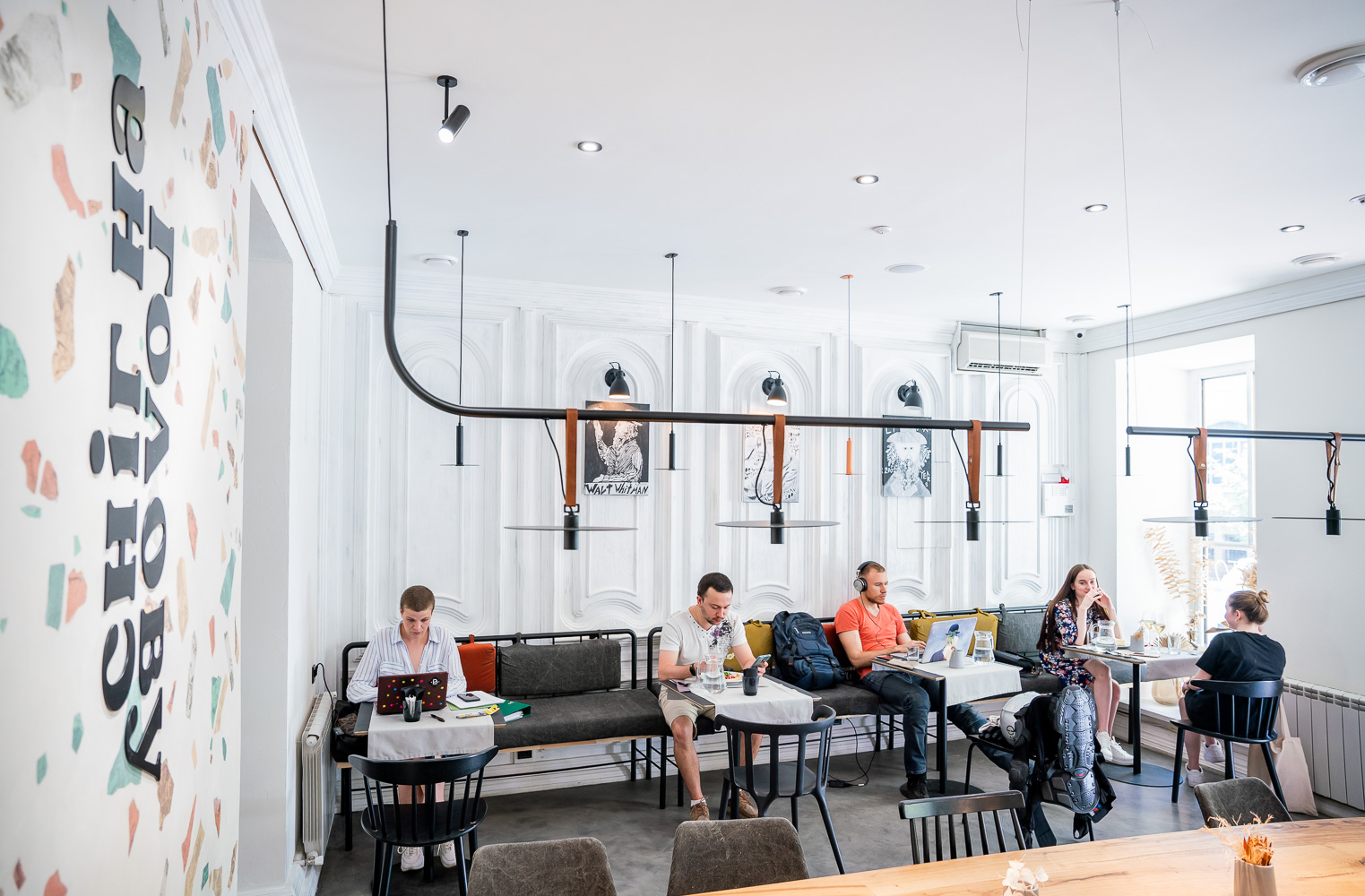
“The idea of a gourmet restaurant, where ostrich meat steaks are served instead of fast food, did not come to us immediately. In the beginning, we weren’t thinking big: for example, we thought about a small coffee shop where we could either just heat up croissants or, at most, bake some cinnamon buns,” Mykhailo says and recalls how it took them a year and a half to implement the idea.
Parents on the balcony
Tetiana and Mykhailo searched for project participants through social networks and word of mouth Eventually, they were joined by ten Kharkiv residents aged 18 to 44. All of them have a mental disability—mostly Down syndrome or autism spectrum disorder. And this job represents an opportunity for all of them. After all, of the thousands of adult Ukrainians with mental disorders, very few manage to become active members of society, and even fewer have full-time, paid jobs.
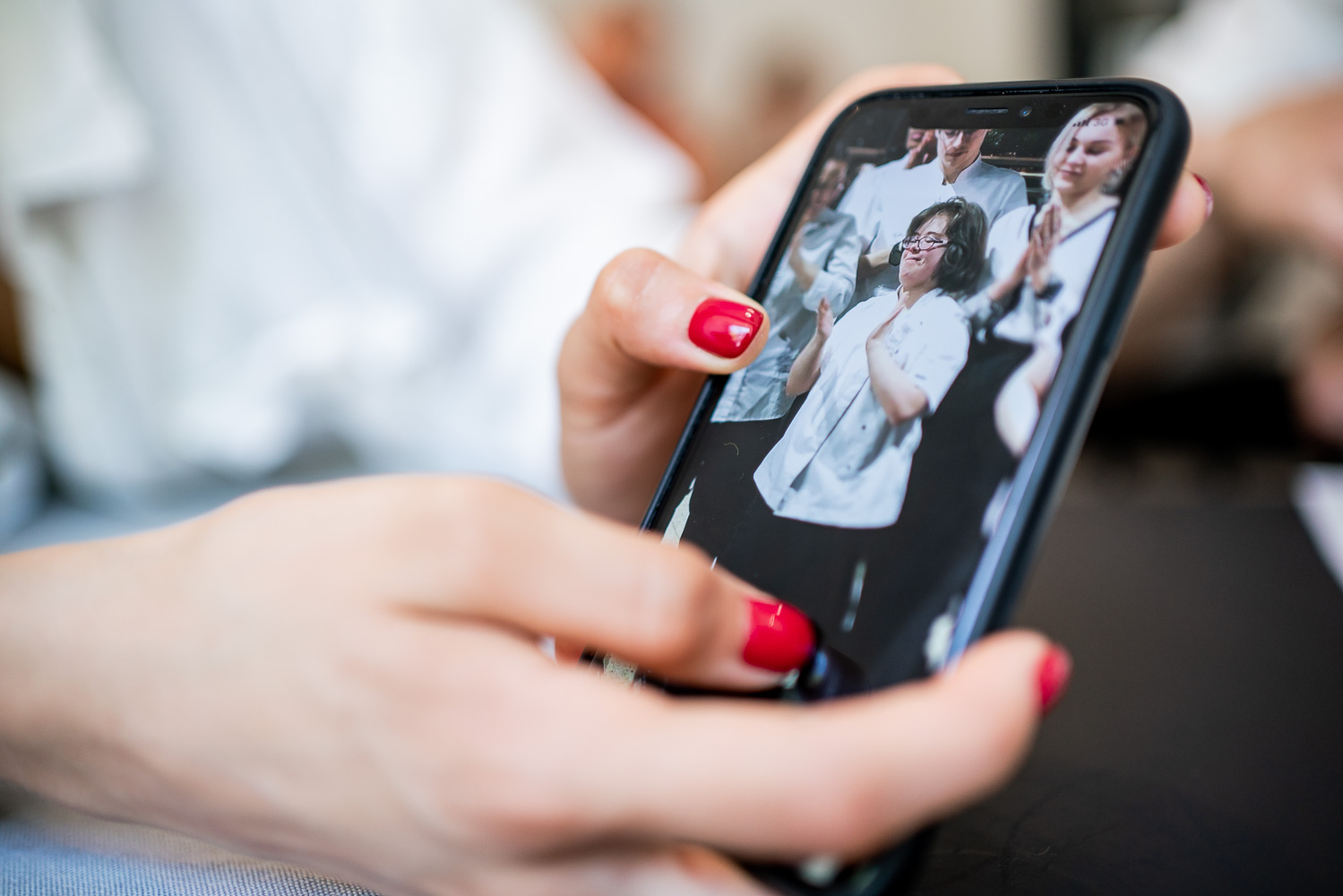
The issue of employment for people with mental disabilities in Ukraine is much deeper than it seems at first glance. According to Olha Berezovska, head of the Our Children Correctional Center for special needs children, currently in our country there are critically few people with congenital diseases who can enter work when they reach adulthood. This is a consequence of the systemic approach practiced until 1986 based on which all children with mental disabilities, regardless of the presence of comorbidities, were diagnosed with “schizophrenia” as soon as they turned 18. And the parents themselves were not good at preparing their children for the wider world—they saw how society pushed their kids aside into the shadows and wanted to protect them instead.
A new, inclusive vision has emerged in education relatively recently, so there is a chance that children under the age of 18 will be able to work in 5-10 years and help change public perception.
The founders of Snih Na Holovu have already started working on it. To dispel the myth about the inability of project participants to be useful, working members of society, to understand what exact jobs the participants will be able to perform in the kitchen, and to decide what the business will be—a restaurant, a café or just a coffee shop—they decided to train up the future team at their own expense. The training lasted at least six months and took place at the premises of the Kharkiv Culinary Academy Al.Cuisine. Oleksandr Bilodid, a participant in the popular culinary TV show MasterChef, who is now chef at the restaurant, was the mentor and teacher for the project. The training program involved several stages and, in fact, was preparation for two big so-called dinner parties, which took place at the Sumy Market in Kharkiv. The tickets were sold for UAH 450 and UAH 600 and all interested were invited.
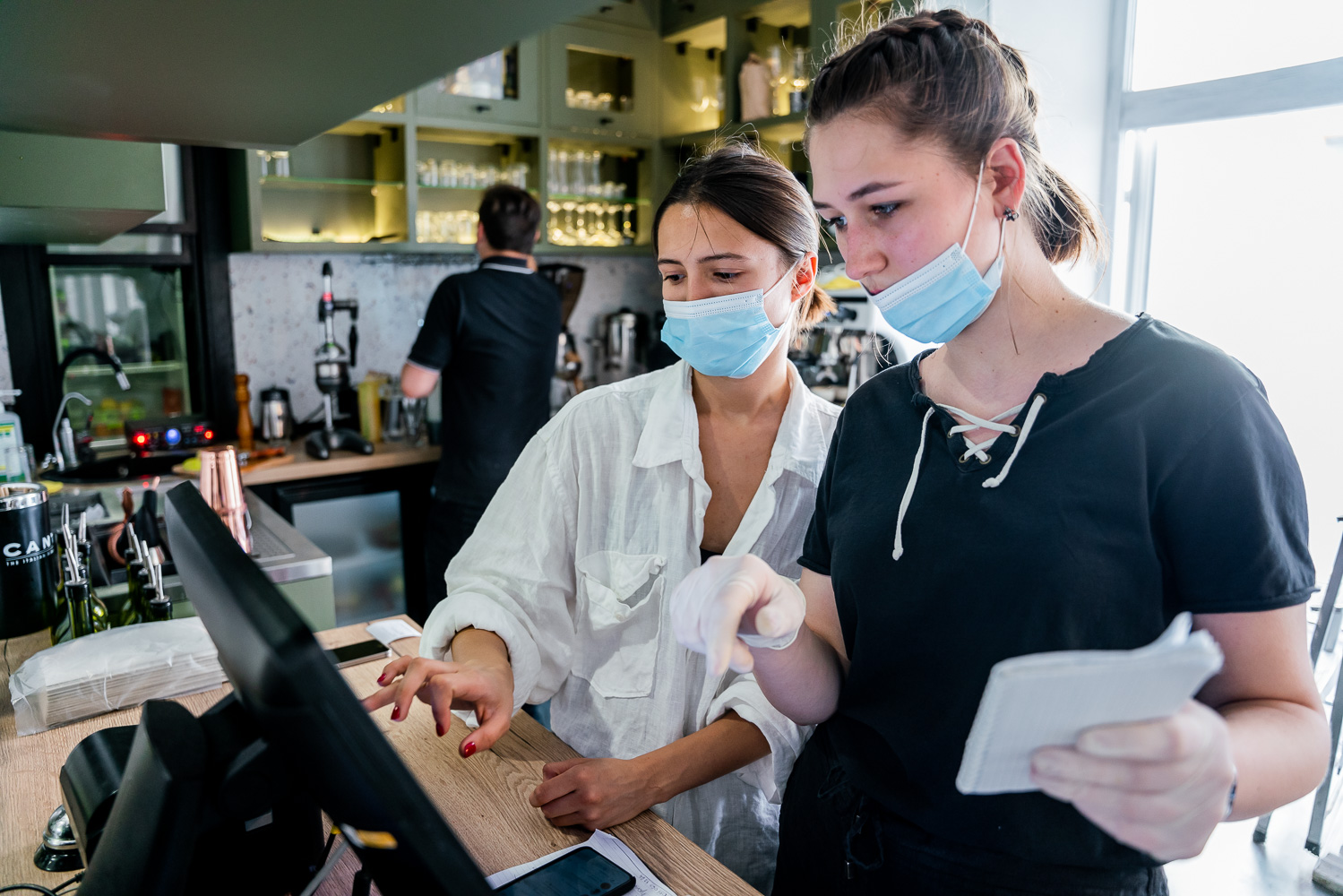
Ten participants, depending on their previously acquired skills, were divided according to areas of responsibility: cutting salads, working with dough, helping with desserts. All of them, except the oldest, a 44-year-old woman who used to have a job at the post office, had never had a job in their lives. So, even their parents perceived the whole thing as more of a fun activity and an opportunity to get to know their adult children better. Almost no one thought that the project would provide permanent employment.
The team spent 4-8 hours a week for about a month and a half getting ready for the dinner parties. In the end, the newly trained chefs exceeded all expectations—under the guidance of experienced colleagues, they prepared not burgers but gourmet dishes: pasta in wine and cream sauce with mussels and tomatoes or foie gras in dark chocolate with hazelnuts. Meanwhile, their parents had to face the challenge of allowing their adult children to be independent.
“It was very hard for the relatives of the team members to understand why we did not ask them to come and provide support,” Tetiana recalls. “Most also did not understand the importance of so much training. On the day of the dinner party, which lasted from 9 pm to 11 pm, the team arrived at the location at noon. The parents said: ‘Rehearsals are not held on the day of the première.’ And I replied: ‘This is no rehearsal, it is their job.’”
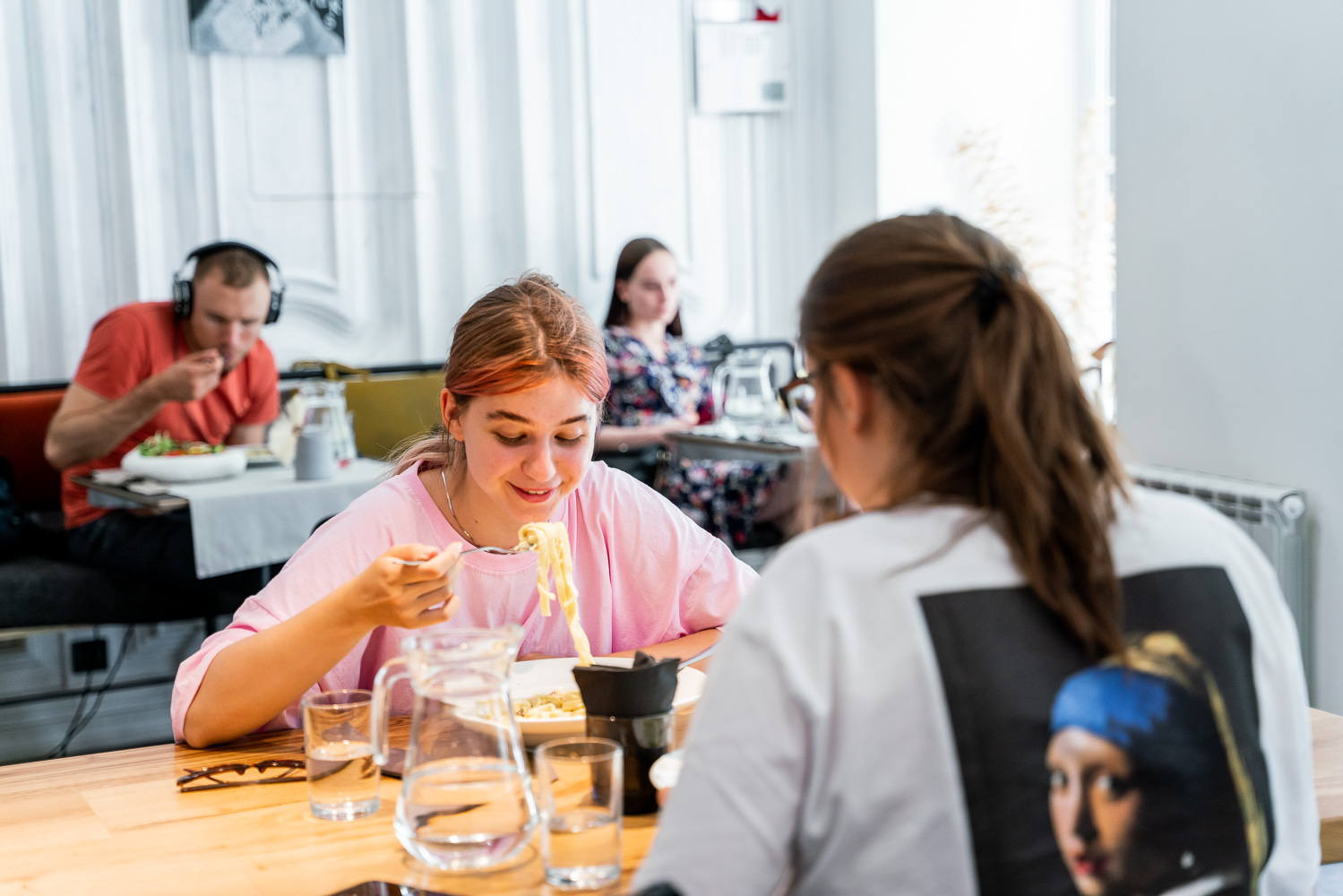
The parents of the project participants gathered on the balcony—the second floor of the Sumy Market—to watch their children perform what were once difficult kitchen tasks. From that vantage point, their sons and daughters could not see them, but the parents could look through binoculars at how well adapted their children had become to teamwork: without the intervention and constant control of relatives, with new challenges and unconventional tasks, with praise and appreciation from total strangers.
When the training program ended, the relatives were required to allow their adult children to come to the restaurant on their own or to accompany them as unobtrusively as possible, and also to recognize that this was a real job, with duties and responsibilities.
“We pay by the hour,” Mykhailo says, rejecting the numerous incoming calls on his mobile. “This is how public catering works. They can earn up to several thousand hryvnias a month—which is not much, but it is money honestly earned. In the kitchen, our employees with mental disabilities help the senior chefs: for example, roll the dough for the spaghetti or cut the vegetables for salads.”
Overall, the restaurant team consists of two dozen people. Most of those who already have restaurant experience are open about their motives: they came to Snih Na Holovu, in particular, to join a socially important cause.
Lia
“It will be very hard for you. Really hard,” the stern head of one of the departments at the Kharkiv Perinatal Center sighs and rolls her eyes. A few minutes ago, she showed 34-year-old Olena her newborn daughter Lia, and the mother took a look at the baby and cried.
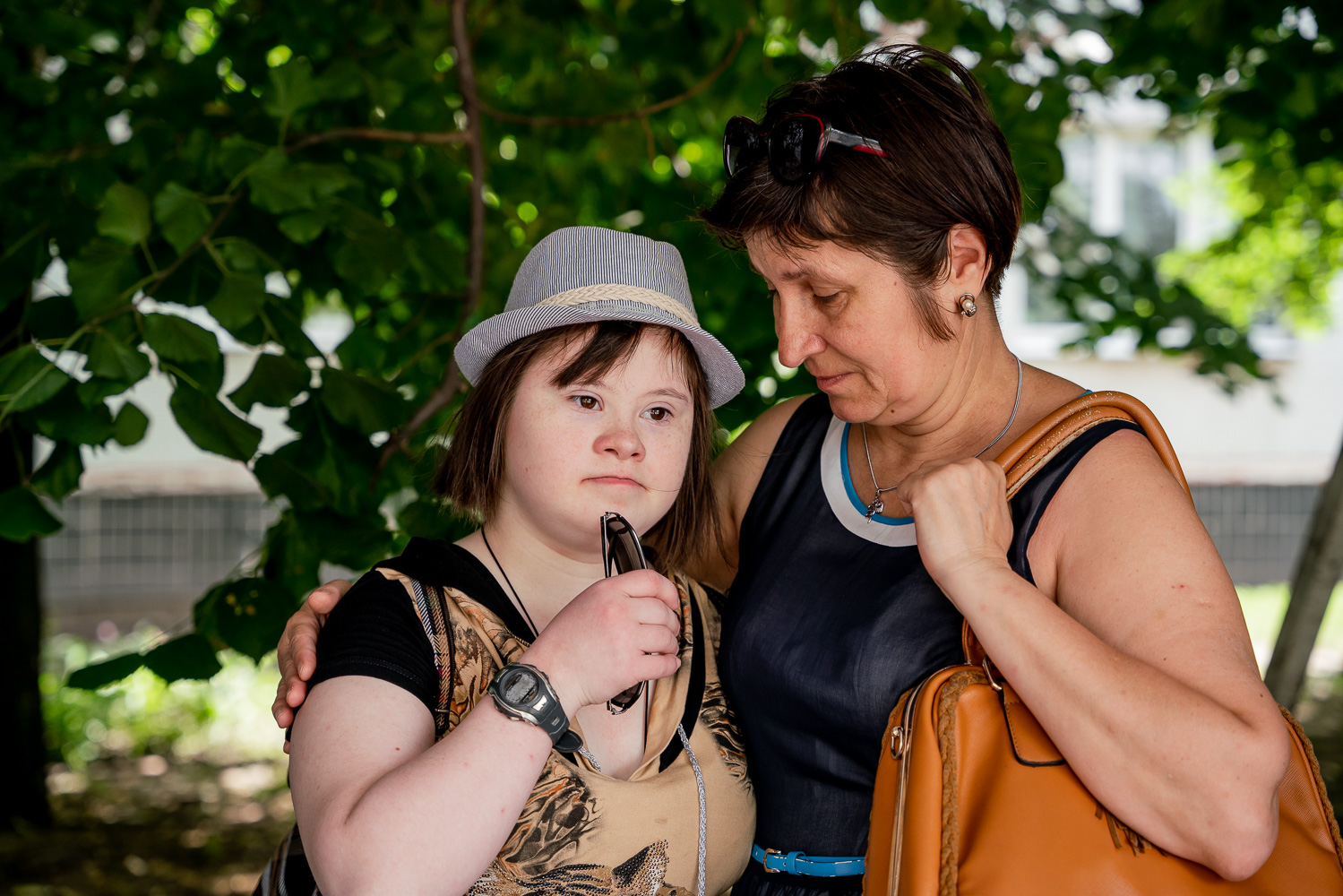
Olena learned that her second child could be born with health issues in the last months of her pregnancy. During a routine ultrasound back in 1998, the doctor examined her belly with a special device suspiciously longer than usual, asked her students to approach, squinted, and told them to “pay attention to the shortened limbs”. Nobody explained to the woman at the time what it was exactly that she had to fear. The pediadontist herself went through the possible diagnoses in her head, and then banished the horrible thoughts from her mind.
“Everything became clear after the baby was born,” Olena says almost 22 years later. “The staff sighed so hard, and my husband and I were so scared that we decided to give the baby up. But when I returned home, I was restless. I would cry into the pillow, struggling with my thoughts: Who would need Lia in our country? Who else, but us? In the end, as they say, I summoned up the courage, accepted the situation and decided to stop the abdication process. While my daughter was being baptized in a cramped staff room, I was running around sorting out all the paperwork. Lia was born on November 14, and by the New Year we had already taken her home. I have no idea how I could live without her. I guess I couldn’t. I would not forgive myself if I had not come to my senses.”
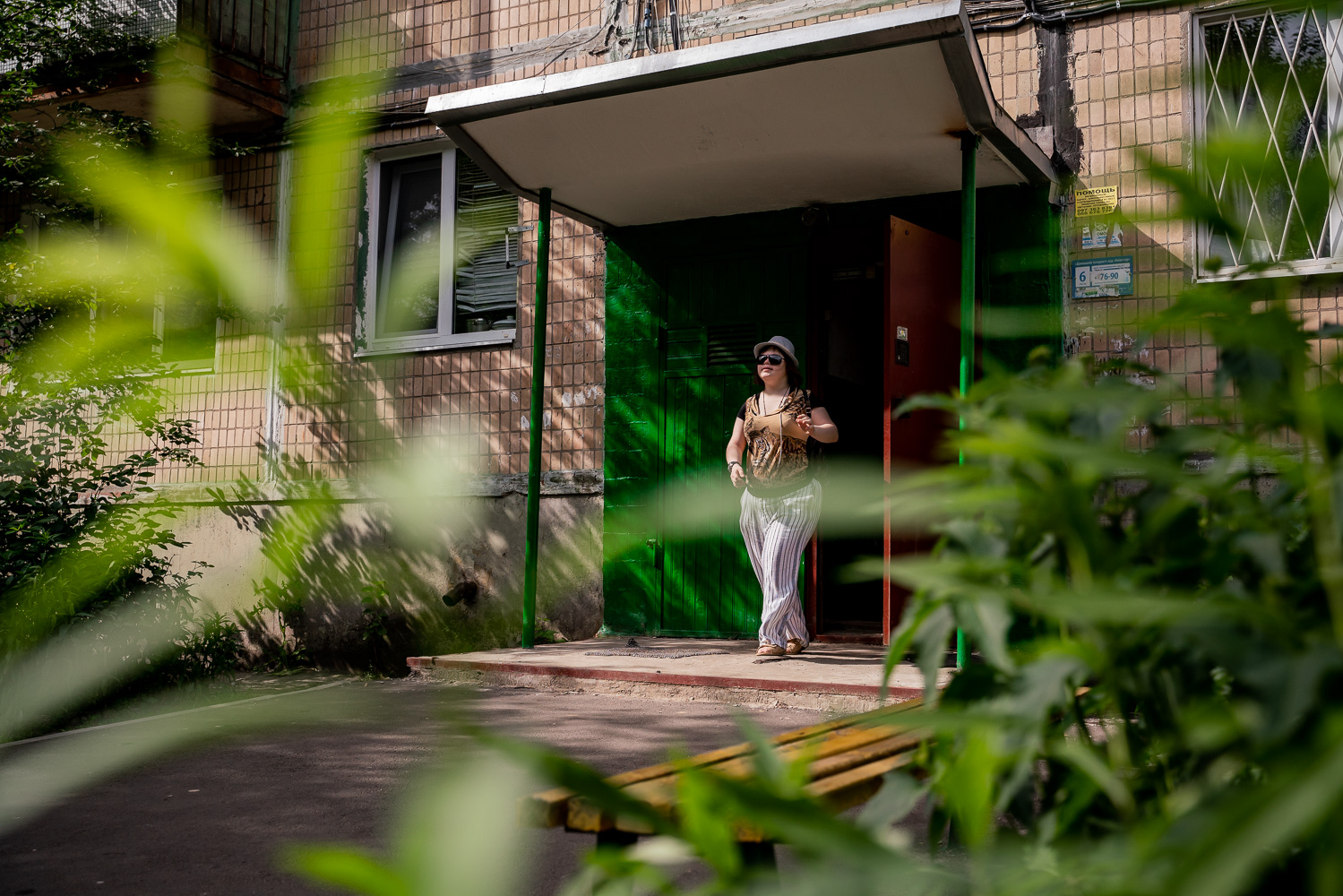
Among the apartment buildings in Saltivka, the largest bedroom community in entire Ukraine, Lia looks like a ray of sunshine after the rain. Wearing light pants and a cap, fashionable sunglasses and a chequered backpack, she swings back and forth on a swing, smiling and waving to friends.
“Mooommy!” she drawls out loudly as we are talking on the bench next to her.
“Yes, honey?”
“They took my pic-ture!”
“Cool! You are doing great!”
“Yeees!”
Olena does not complain about her life. She does not consider her family to be special. And, fortunately, she has no stories of her daughter being badly treated. In a special kindergarten and school, in public transport, in food establishments, by the seaside and now just on the street—according to her, Lia has never been insulted.
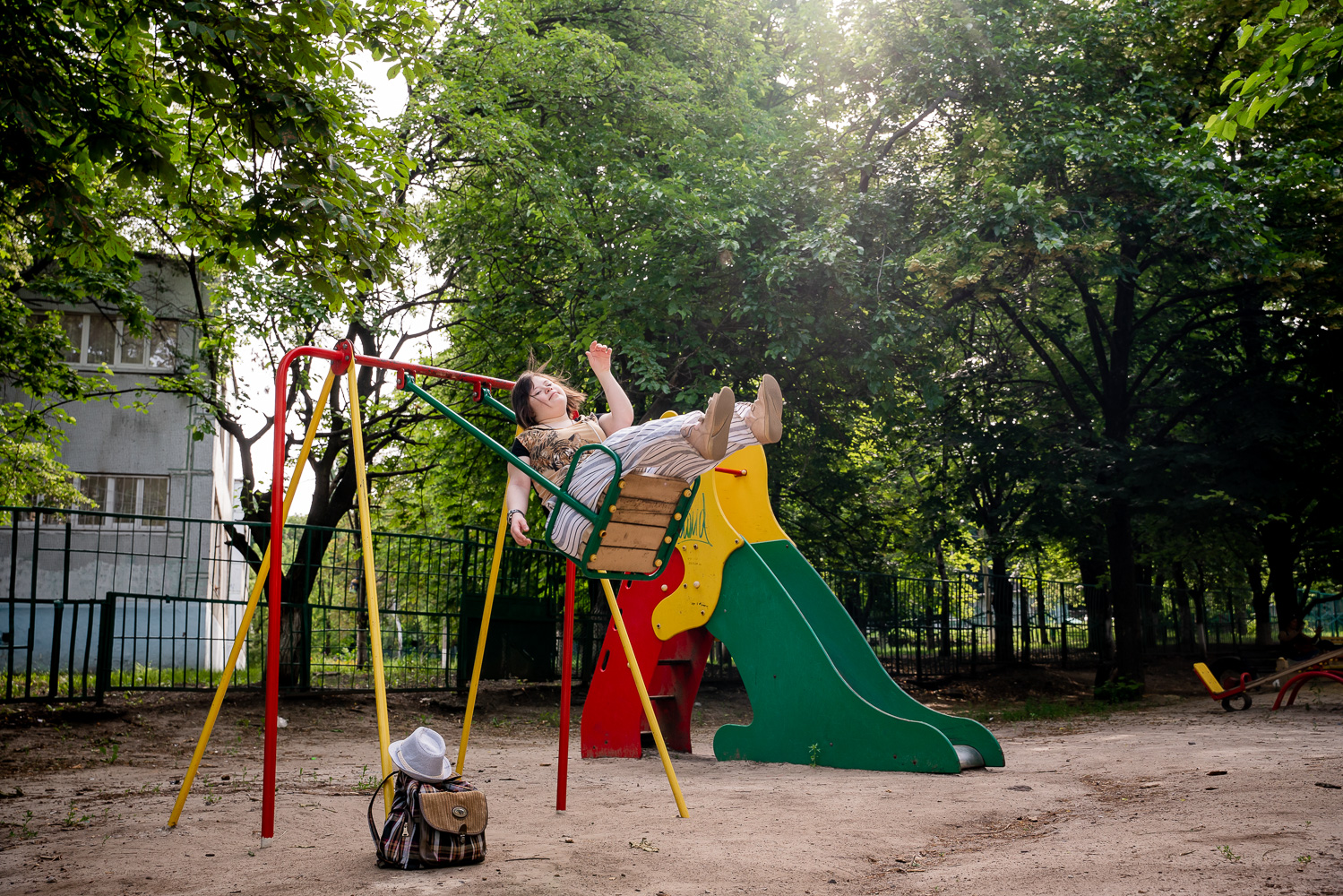
“Not so long ago Lia got lost while going back home on her own,” Olena says. “Her brother Heorhii, who is seven years older, searched for her for several hours. He found her in the town center, got emotional and started yelling at her: ‘Where have you been? Where did you go? How could you do this?!’ I arrived and saw people surrounding Heorhii and taking Lia away from him. One girl took my daughter aside, and started to calm her down: ‘Don’t cry! No one will hurt you! We will help you! We will call the police!’ I said: ‘I am their mother and I will take care of both of them!’ But the people were reluctant—they asked us questions and requested that I show them documents. This is a good thing. In fact, we have many caring, good people.”
While other parents of children with disabilities were focused on medical matters, Olena, on the other hand, sought to forget what she had once learned at university. Back in Soviet times, she was told that a child with Down syndrome would never be able to learn, and would never be independent or sociable. And now her Lia easily meets new people, has a high school education and even tried going to college, but is now leaving it of her own free will (she expected to be taking care of plants, but instead she learns just bare theory there). Since January, the 21-year-old has been working as an assistant chef at Snih Na Holovu restaurant.
“Honestly, I do not know exactly what my daughter is doing there,” Olena admits. “She helps in the kitchen, but we do not ask about the details—the owners of the restaurant ask that we give our children the opportunity to be independent. It was the same during training: I went to watch Lia cook, and Tanya, so small and fragile, stopped me and said firmly: ‘No, sorry. Lia has to do this on her own. Come back after work.’”
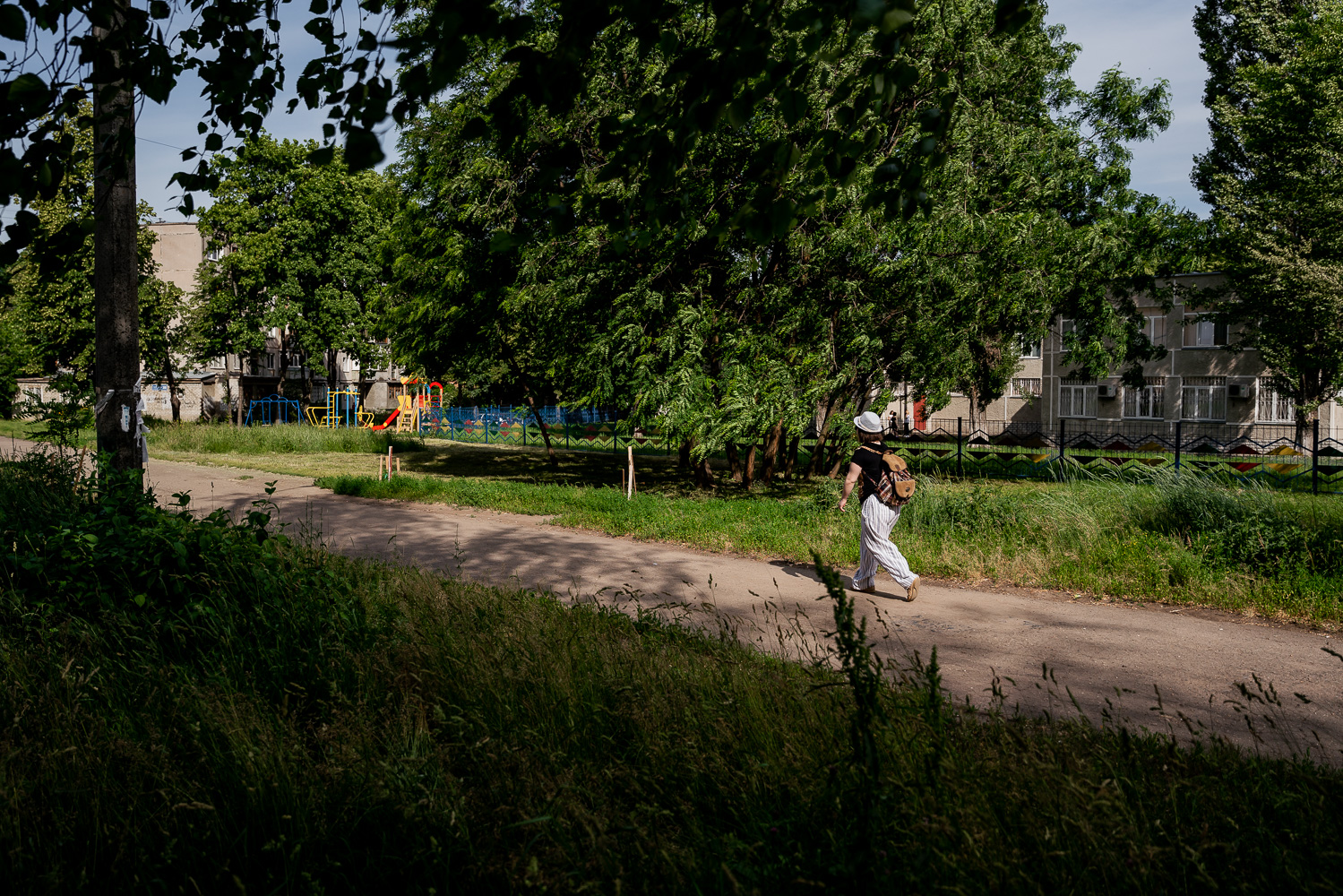
Olena used to take her daughter to training and then to work almost by hand. Then she realized that Lia was able to learn a new route and go to the restaurant in the center of town on her own. She watched her daughter on several occasions: she would hide behind trees, run across the street, and then bump into her on the subway. Yet, every time she pretended that the meetings were accidental. “She is an adult, she is independent, she is doing great,” the mother would repeat to herself like a mantra.
The trip from home to work takes Lia about 40 minutes. She goes to the restaurant by trolleybus and subway. The girl knows the names of the stops, has a discount travel card, and, if the route is the same, can find her way home even on foot. Ever since Lia started travelling around the city on her own, her mother has been worried that her daughter would forget to follow traffic rules or be polite in public transport. As we stand at a pedestrian crossing, the girl watches for the green light, while blocking us with her outstretched hand. In the subway, she holds a heavy glass door open—waits for me to arrive, and hurries me up: “Olia, come on! Let’s go!”
Lia jumps off the swing, spreads out her arms like a gymnast, straightens her grey cap, and with her never-fading smile says: “Mom! See you! Mom, see you!” And then quickly walks away through the yards past the grey high-rise buildings. Suddenly she notices our tail job and waves her hand: “Here! Here!” Lia stands out for her small height and effusive sincerity. The girl with a chequered backpack, it seems, is willing to be friendly with everyone: she even says “no” to an annoying liquored up beggar with a smile.
On her way to work, Lia deliberately goes up or down any stairs or ramps she comes across. Her mother says overcoming small obstacles is her hobby. It is her daily personal challenge—to climb and jump over whatever she can. In the same way, having found a job in the restaurant, she has exceeded all the hopes of her family:
“I remember asking Tanya: ‘How long will the training take?’ And she shrugged: ‘Until all the participants can get a job.’ It was strange that someone else needed my child. And not just, as had happened many times, during the period of some grant, which would inevitably come to an end, but selflessly, investing their own funds.”
In addition to more independence, Lia has already mastered new culinary skills at work. Previously, the girl would just peel potatoes with a “safe knife”, but now she skillfully cuts salads, and enjoys cooking for her loved ones.
Lia is in a hurry and even a little annoyed when we ask her to stop for a photo. She hugs us and then literally pushes us on.
“She is afraid to be late,” Olena explains. “She really wants to go to work.”
Arriving at the restaurant, the girl becomes even more animated: she hurries to change her clothes, changes her cap, puts on a special robe, washes her hands and literally runs into the kitchen.
Due to additional safety measures resulting from the quarantine, and the fact that we do not have sanitary certificates, we are not allowed into the kitchen of the restaurant. Through the glass wall, we observe Lia going from dish to dish under the supervision of senior chefs: first she helps with the dough, then prepares meals for delivery.
About half an hour later, she runs out of the kitchen into the hall as quickly as she came in: she smiles at the visitors, walks between the tables, swiftly returns back, stops at the kitchen door and makes a “V” sign with her fingers. Victory!
Tosha
Anton, like his colleague, moves swiftly around the restaurant. Called Tosha by his relatives, he is tall and broad-shouldered. He utters something, barely perceptible. Adjusts his green cap almost every second, and then abruptly, as if remembering something, disappears.
Tosha has been with Snih Na Holovu from the beginning. Despite being autistic, the 18-year-old is the only one here who works in the kitchen every day, and not in shifts like the rest. Most of all, he likes working with the dough and being responsible for making complicated dishes such as Italian ravioli. When we met, Anton shook my hand. He would not let it go for a few minutes, as if trying to understand what kind of person I was by touching it. And he smiled and looked right into my eyes.
“We could see that there was something wrong with Tosha when he was about two years old,” the young man’s grandfather, Borys Dmytrovych says. At this age, children are already talking, and our Tosha was not. In fact, not much is known about autism still.”
Anton lives near the restaurant, so he goes to work and back unaccompanied. Along the way, he usually does not get lost. When he is late, he may bump into one of the owners of the restaurant, get upset, lower his eyes and run across the street to the other side.
Thanks to the work of his family and his own hard work, Tosha has had great success with social adaptation even before the restaurant job. In particular, he took part in a social project whose participants were trained up to work in one of the large supermarkets—they tried their hand as bakers and cashiers. Therefore, the restaurant for Anton is more an opportunity to earn a little extra money and gain new professional skills.
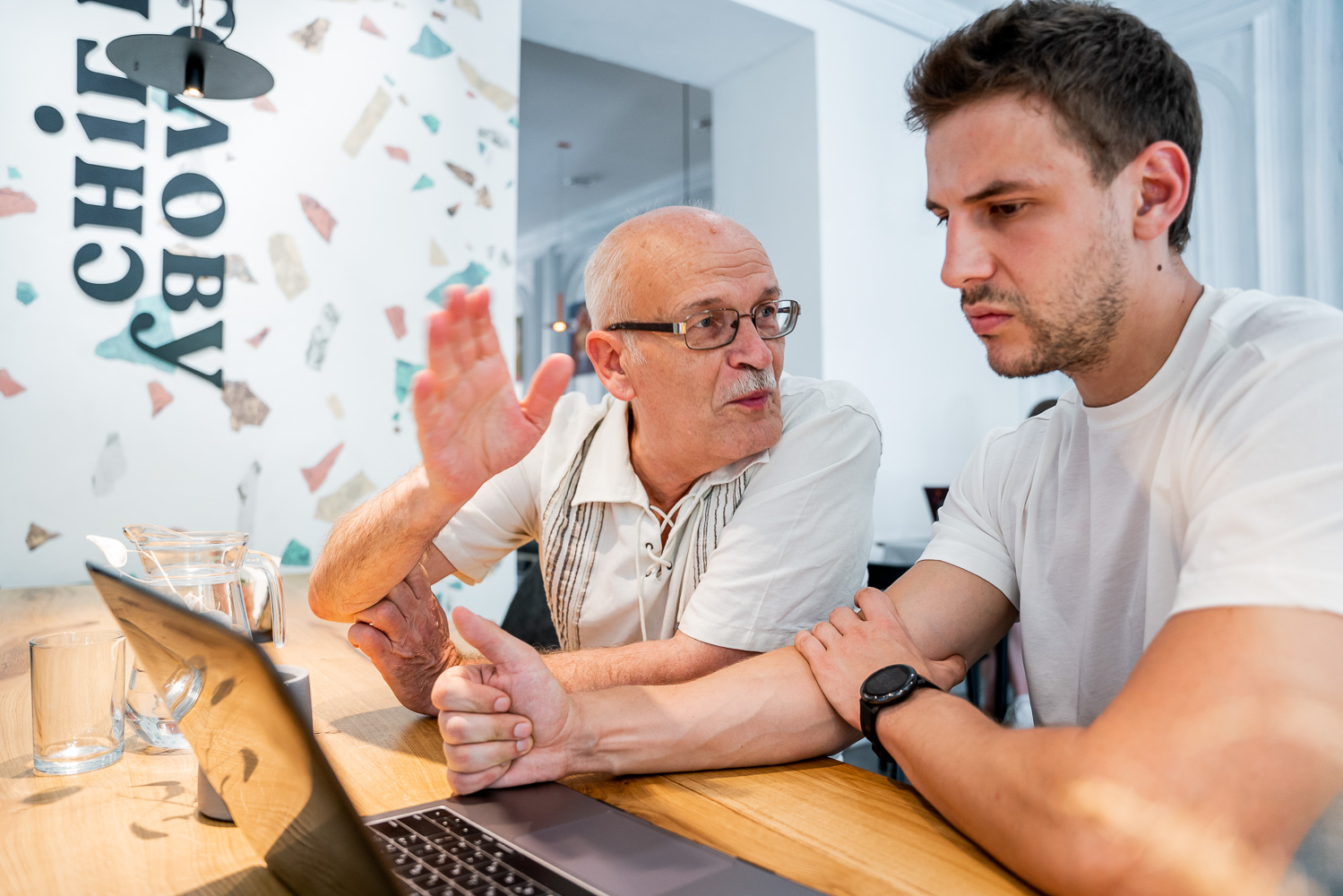
“Anton follows the example of the senior cooks,” Borys Dmytrovych continues. “For example, he has learned to cut vegetables like a professional. We visited some friends recently: everyone admiringly watched Tosha masterfully making a salad. You should see him do it!”
Anton’s grandfather, Ph.D. in Philosophy and Associate Professor, lectures at one of the Kharkiv universities and has a certain manner about him, making one wish to straighten up. The way he speaks makes it immediately clear: you are talking to a strict teacher. Borys Dmytrovych is a little annoyed when I ask him about overprotection. He says he does not understand why the relatives of Tosha’s autistic peers do not allow their adult children to feel at least some independence.
“Last year Tosha graduated from a special school. Now I look at some of his classmates, the same tough guys aged 17-18. And you know what? Their moms are still leading them by the hand. By the hand, can you imagine? It is wrong.”
In addition to his grandfather, since childhood Anton’s development has been taken care of by his mother and grandmother, who still works as a psychotherapist. According to Borys Dmytrovych, not many books have been read about autism in the family. At some point, they realized that the model that offers the optimal development of skills based on the stimulus-response principle was not effective enough, so they decided to work on Tosha’s creative abilities.
Sometimes Anton would ask Tanya and Mykhailo to give him a little money in advance—“for some Cola”. The owners never refuse—they play along, asking what kind of drink he is going to enjoy. The grandfather calls his grandson “business-like”. Out of all the participants, Anton has some of the best results in terms of his work and incorporation into the team.
Surprisingly, according to relatives and owners of the restaurant, his biggest problem is that he never gets tired. He gives so much of himself in the kitchen that he won’t leave until he is told to do so several times: “Your shift is over, you have to go home now!”
“Autistic individuals do not feel like they have family ties,” his grandfather explains. “While others are aware of the closeness of the family, it would be difficult to explain to Anton who an uncle or an aunt is. Still, he is sensitive, kind and open to the world. He just constructs the meaning of everything differently.”
Non-culinary tricks
In fact, teaching mentally disabled employees simple cooking techniques and then giving them a job in the restaurant kitchen is one of the easiest social tasks of Snih Na Holovu. The most difficult challenges are changing parental attitudes and societal acceptance.
“We still have to tell some parents that it is not necessary to wait for their adult children in the restaurant hall,” Mykhailo says. “This work involves socializing with peers, free from overprotection. We even thought of banning the parents of employees from visiting the restaurant, but then we realized that would not be fair. So the relatives of project participants often come to visit us: bring friends and even celebrate birthdays.”
To make it easier for parents to finally let their adult children enter adulthood, Tetiana and Mykhailo recently employed a coordinator—a person with a degree in psychology who would organize the work of employees, including shift schedules, liaise with parents, help the adult children to adapt to society, and design an individual path to inclusion for everyone.
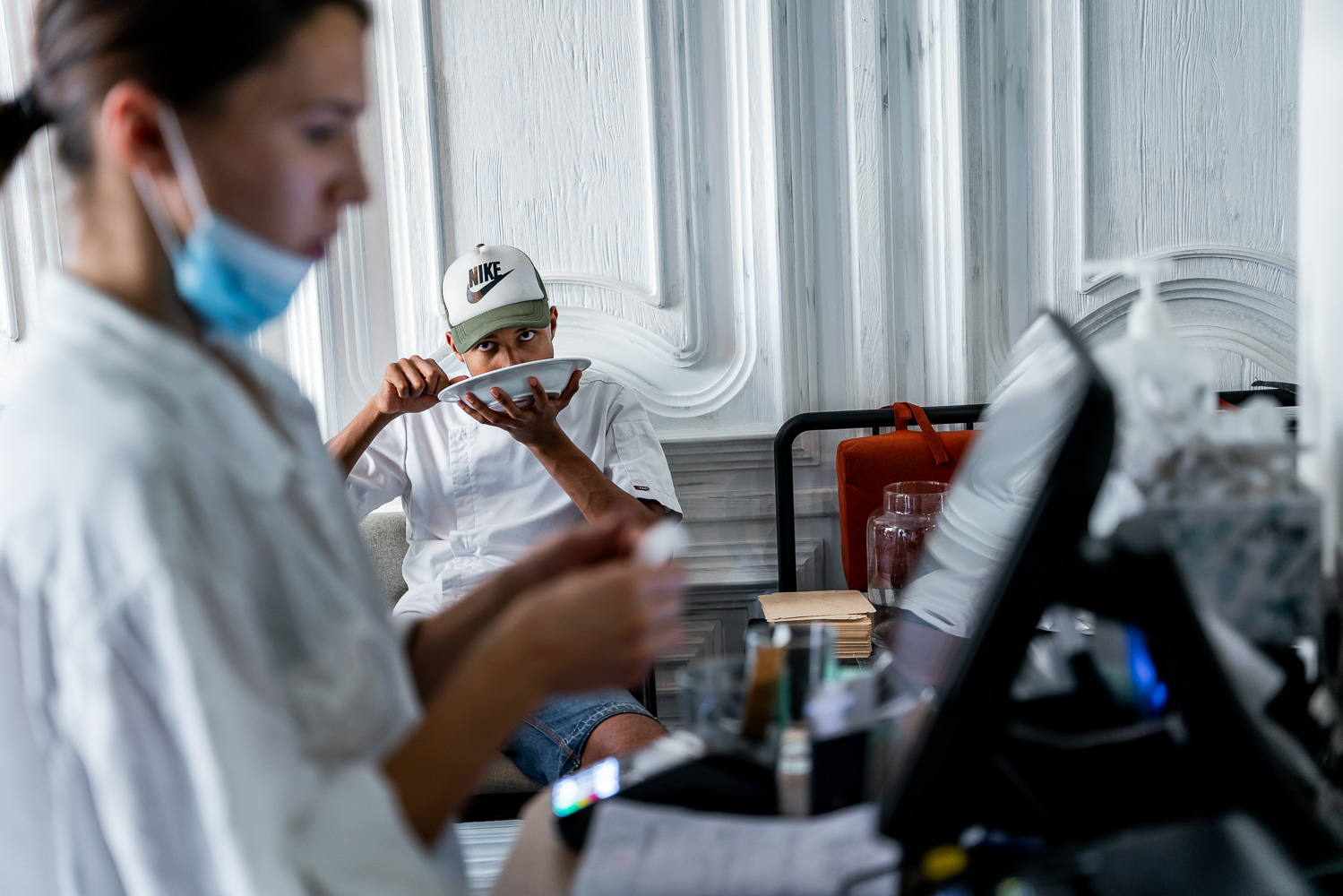
Meanwhile, Snih Na Holovu helps not only the families of disabled people, but also the owners of the restaurant. When Tetiana and Mykhailo were just getting ready to launch the project, they decided to conduct a series of in-depth interviews with their acquaintances. For example, they asked how their friends would react to a restaurant employing cooks with Down syndrome. Mykhailo says that he was generally ready for negative reactions, but his partner admits: at first, she could not understand why tolerant and educated Kharkivites would state that they were unwilling to eat food prepared by people with disabilities.
“Those interviews had a big impact on us. We realized that there was a problem even among our social circle. So, we had to be patient, explain everything we were doing, and show through the example of our own restaurant that everyone can and should have a place in society,” Tetiana emphasizes.
Despite the fact that Snih Na Holovu has been open for less than half a year, some acquaintances of the partners have already overcome their bias. At first, they came to the restaurant to support Tanya and Mykhailo, or just out of curiosity. And now they book tables, because they have seen that the place has really delicious food and the service is great.
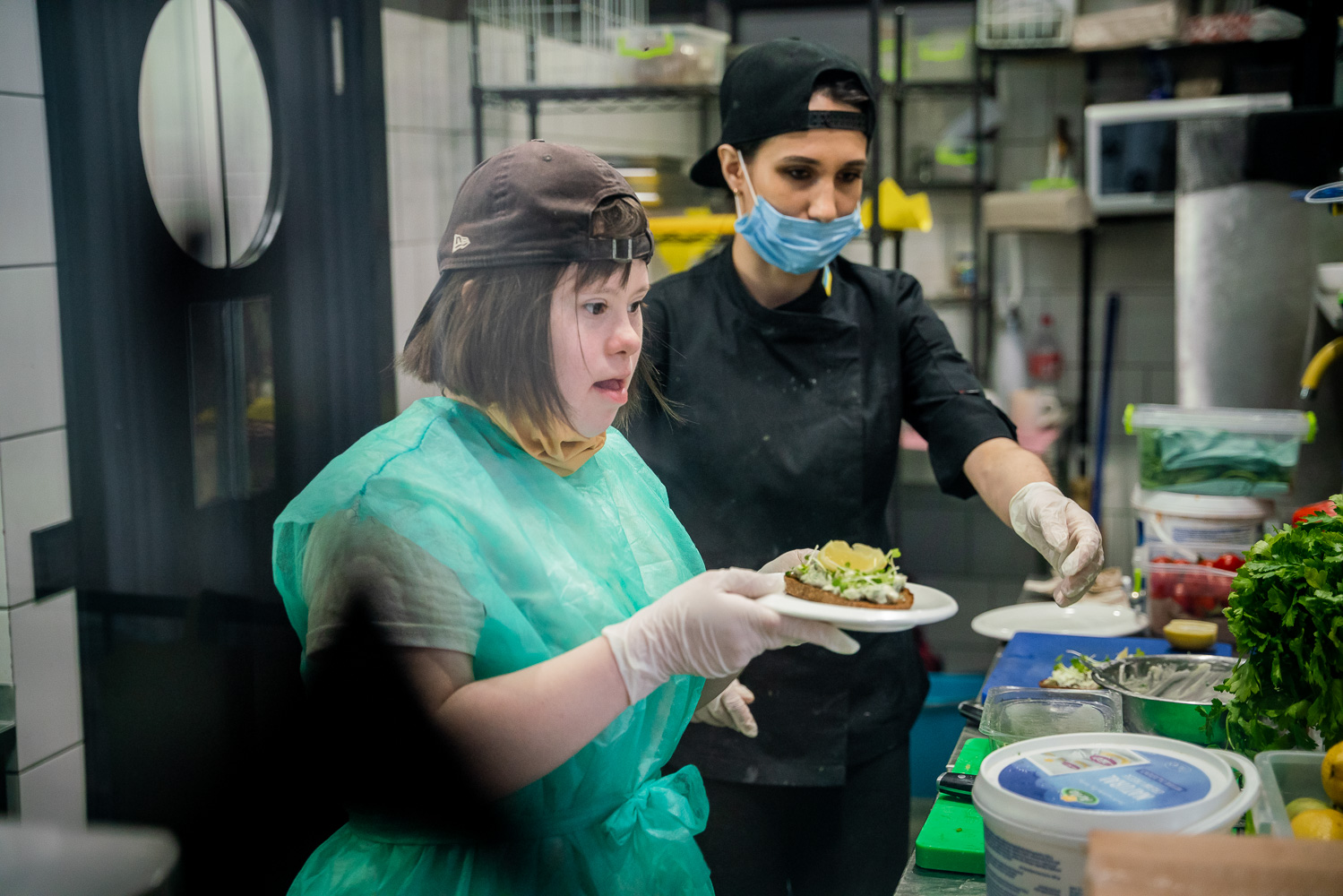
“We believe our restaurant will become an example for others and new socially responsible businesses will open up in Ukraine,” Mykhailo sums up. “By the way, there are two approaches to this issue in the world: American—when businesses are obliged to provide jobs for people with disabilities, and European—when social protection is provided by the government, and business provides funds in the form of taxes. We have combined them: we hired chefs with disabilities and also created a fund where we transfer one tenth of the profits. With the funds we raise, we first plan to open an inclusive camp for children with disabilities in Kharkiv. We wanted to open it this summer, but the quarantine prevented it.”
***
When we leave Snih Na Holovu, Lia does not even look in our direction. An hour ago, on the street, she was drawing attention to herself and actively posing for the camera. But now she is so focused on rolling out the dough and helping with the salad that it seems as if nothing else exists for her outside the kitchen. Lia smiles to herself, grimaces a little when something does not go as she wants, then heaves a sigh and breaks into a smile again.
[This story was created with support of the Royal Norwegian Embassy in Ukraine. The views and opinions expressed in this publication are those of the authors and do not necessarily reflect the official position of the Norwegian government.]
Have read to the end! What's next?
Next is a small request.
Building media in Ukraine is not an easy task. It requires special experience, knowledge and special resources. Literary reportage is also one of the most expensive genres of journalism. That's why we need your support.
We have no investors or "friendly politicians" - we’ve always been independent. The only dependence we would like to have is dependence on educated and caring readers. We invite you to support us on Patreon, so we could create more valuable things with your help.
Reports130
More





